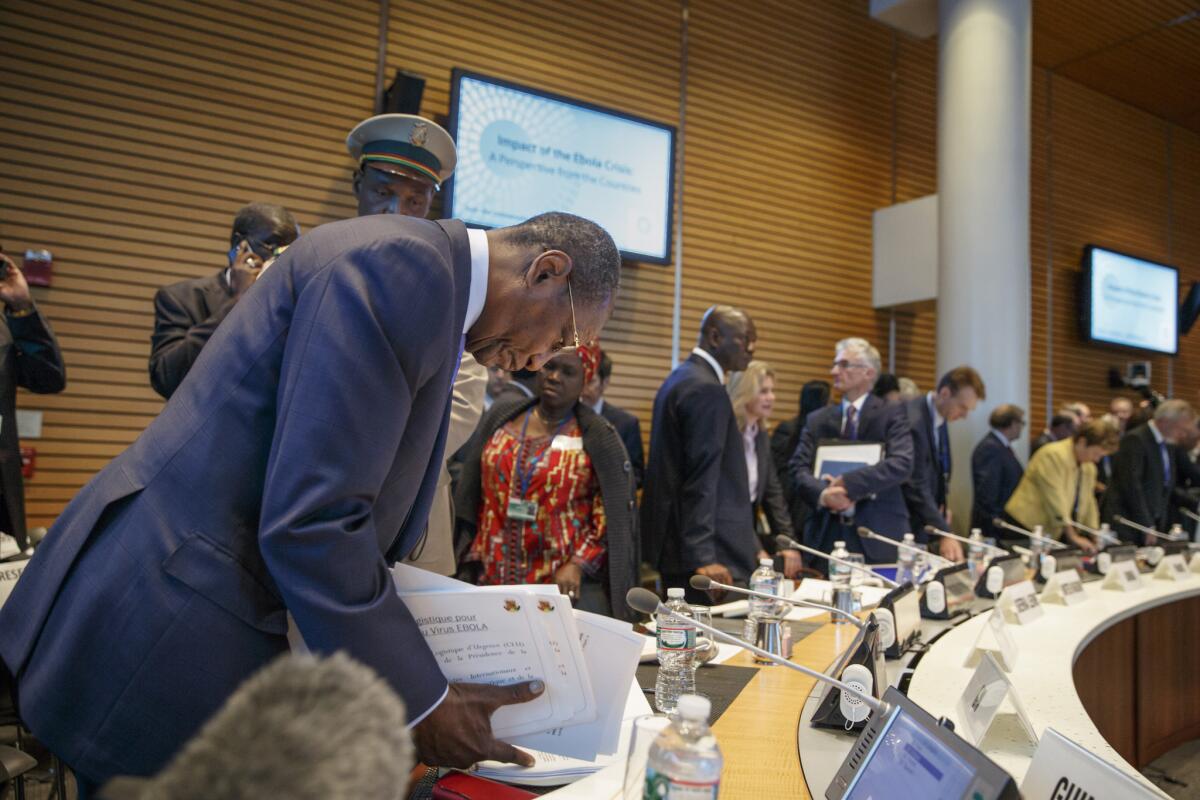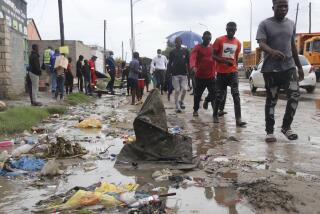Leaders call for quicker response to Ebola at World Bank meeting

Leaders of the three West African nations hardest hit by Ebola sought support from the international financial community Thursday amid warnings that the widening epidemic is devastating the region’s fragile economies.
The presidents of Liberia, Sierra Leone and Guinea discussed strategies to combat the deadly virus during a meeting in Washington of the World Bank and the International Monetary Fund.
The World Bank, which provides loans and funding to developing nations, has pledged $400 million to help combat the epidemic in West Africa, where the disease has claimed more than 3,400 lives since the outbreak began earlier this year.
Already, the three hardest-hit nations have seen significant impacts on their gross domestic product, according to a report the bank released this week, as rural families have abandoned farms and urban centers have closed schools and businesses.
The report says that if the virus spreads no farther, financial losses from declining agricultural output and business revenues could reach roughly $3 billion.
But the report warns that the financial impact could reach $32.6 billion by next year if the epidemic spreads to more densely populated neighboring countries, or around the globe.
“Ebola will cross borders,” said Donald Kaberuka, president of the African Development Bank. “Ebola will affect businesses around the world.”
The first patient diagnosed with Ebola on U.S. soil, Thomas Eric Duncan, died this week in a Dallas hospital after arriving from Liberia, where he contracted the disease.
A Spanish nurse has been placed in quarantine after testing positive for Ebola. She is believed to have caught the virus after treating two missionaries who had returned to Spain from West Africa, in what would be the first recorded transmission of the virus outside of Africa.
Ebola has infected more than 8,000 people in West Africa, according to Jim Yong Kim, president of the World Bank. He urged the international community to do more to help bolster the limited healthcare systems in West Africa, which have been overwhelmed.
“The answer to this crisis is to stop it where it lies,” Kim said. “Doing right by these three countries is the right thing to do. We’ve just got to get moving.”
The Pentagon has begun setting up mobile testing laboratories and other facilities in Liberia, the hardest-hit nation, but the U.S. assistance is still in its early stages.
“In the 30 years I’ve been working in public health, the only thing like this has been AIDS,” said Thomas Frieden, director of the U.S. Centers for Disease Control. “We need to act now so that this is not the world’s next AIDS.”
The three West African leaders said they need more help setting up medical treatment networks, including laboratories to test for the virus and field hospitals to treat patients in strict quarantine.
While non-governmental organizations and charities have provided the bulk of the relief so far, leaders said more assistance is needed.
“What is required today was required yesterday,” said President Ernest Bai Koroma of Sierra Leone, speaking on a video link. “Commitments on paper and commitments during meetings are good, but commitments as physical facts on the ground are best.”
The four laboratories in Sierra Leone can process fewer than 150 samples per day for the virus, Koroma said, and the transmission rate is far faster than the public health response.
In Liberia, nearly 100 health workers have died from Ebola, said President Ellen Johnson-Sirleaf, also on a video link. She said additional treatment and testing centers are desperately needed there.
The epidemic has become firmly rooted in the three nations’ capital cities and 70% of those infected die, according to Bruce Aylward of the World Health Organization. There is no known cure.
“The situation is worse than it was 12 days ago,” he said. “It’s accelerating.” He said his organization would be pushing for safe burials and isolation of patients in the next 60 days.
Participants in the conference, which included representatives from the United Nations, pledged to speed up their response. They said the growing international concern is helping remove several roadblocks, including a lack of coordination and funding.
One challenge had been guaranteeing medical evacuation flights for international health workers infected with Ebola. European and American officials said they now can evacuate personnel in 48 hours or less.
China has sent 100 medical workers to West Africa, a representative said. Other nations, including Norway and Switzerland, also have pledged emergency aid.
But logistics remain a problem. Japanese officials said a shipment of medical gear they sent in September is still sitting in an airport in Abidjan, in nearby Ivory Coast.
The Bill and Melinda Gates Foundation donated $50 million to help fight the epidemic, the charity’s largest donation ever for a humanitarian emergency.
Representatives from Nigeria, sub-Saharan Africa’s most populous nation, said a government-sponsored public information campaign -- including text messages to 145 million cellphone users -- helped stop Ebola there.
Neither Nigeria nor Senegal have reported an Ebola case in more than 30 days.
For diplomats in attendance, U.N. Secretary-General Ban Ki-moon had a stark message that contrasted with the standard consensus-building mission of his organization.
“Do not wait for consultation, just take action,” he said. “It’s time for the international community to scale up and step up.”
Twitter: @mtthnsn
More to Read
Start your day right
Sign up for Essential California for news, features and recommendations from the L.A. Times and beyond in your inbox six days a week.
You may occasionally receive promotional content from the Los Angeles Times.






